Have you found a job posting that asks you to submit your resume via email? Or maybe you’ve decided to approach your dream company directly. If so, you’re probably asking yourself right now — what to write in an email when sending my resume so I will stand out?
Sometimes employers provide clear instructions on what the email format should include. If that’s the case, follow the employer’s directions closely.
But if you can’t find any instructions, don’t worry — you can follow the best practices described in this article!
Additionally, there are also 3 email templates for what to write in an email when sending a resume to an employer that you can download and edit to your liking.
- 3 sample emails for sending your resume to recruiters:
- How to email a resume: A few tips to keep in mind before sending the email
- Write an effective subject line. It's the first thing they're going to see
- Email body for sending a resume: Keep it crisp, yet formal
- Attaching files — resume and cover letter
- What should you do before sending your email?
- What to write in your resume email? Key takeaways
3 sample emails for sending your resume to recruiters:
Feel free to use any of these templates as your first draft.
#1 Template of an email to send with your resume
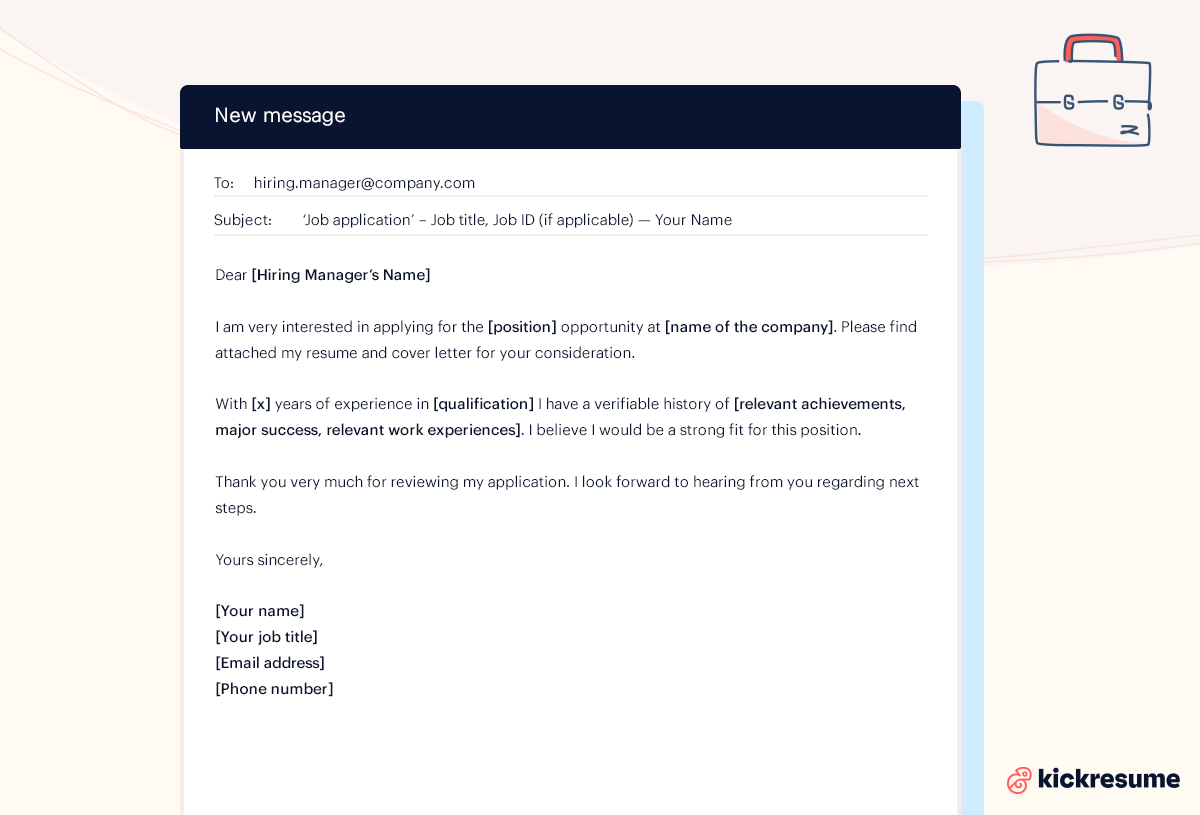
#2 Template of an email to send with your resume

#3 Template of an email to send with your resume
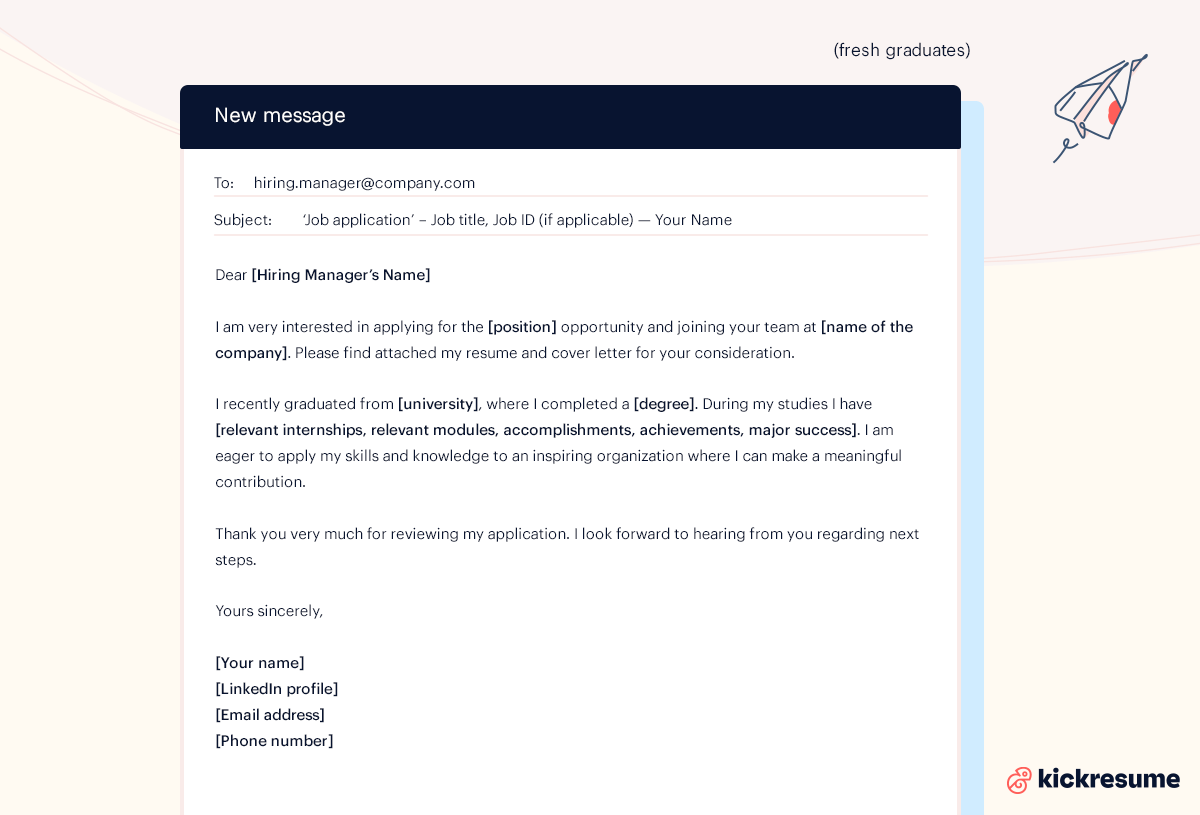
Additionally, these 10 more job application email templates will give you the help you need at any stage of the hiring process.
Finally, if you already have a fantastic LinkedIn profile but no resume, there's no need to write your CV from scratch. You can convert your LinkedIn profile into resume in seconds.
How to email a resume: A few tips to keep in mind before sending the email
Before you start writing, ask yourself this: Who is the person you're writing to?
Try to find the hiring manager's contact details so you can address them by name. A slightly more personal approach can decrease the chance of your resume being forgotten or disposed of.
Remember that your email address needs to be professional. Emails like julezizcoolz@yahoo may have been cool in 2005, but not anymore. Instead, create a professional email address that consists of your first and last name.
You should also consider when to email your resume. In general, you want your email to be among the first ones they receive that day. This means you should send it very early — ideally before 8am.
The same applies for days of week. The later in the week you send your email, the lower the probability that someone reviews it. This is why you should send it very early on a Monday morning.
Naturally, do not put off applying if it's a first come first serve kind of job application.
Key takeaways:
- Look up the hiring manager's contact details;
- Your email address needs to be professional;
- Send it on a Monday, ideally well before 8am;
Write an effective subject line. It's the first thing they're going to see
Sure, the subject line is just a tiny part of the whole email. However, it's also the very first thing the recruiter is going to see. That's why you want the subject line of your resume email to be absolutely spot on.
First of all, check the job posting for instructions regarding the submission. There may be a preferred subject format the company uses. If that's the case, then you need to stick to it.
However, if there are no instructions, you should stick to the standard format for subject lines:
- Subject: ‘Job application’ – Job title, Job ID (if applicable) — Your Name
- Example: Job application – Office Manager, Job ID #1553 — Ian Lumberjack
- Example (with referral): Referral from John Wick: Job application – Graphic Designer, Job ID #1554 — Nina Hughes
If someone recommended you for the job, definitely make this clear in the subject line. You can add your title or qualification if you wish — but remember, keep the subject line succinct.
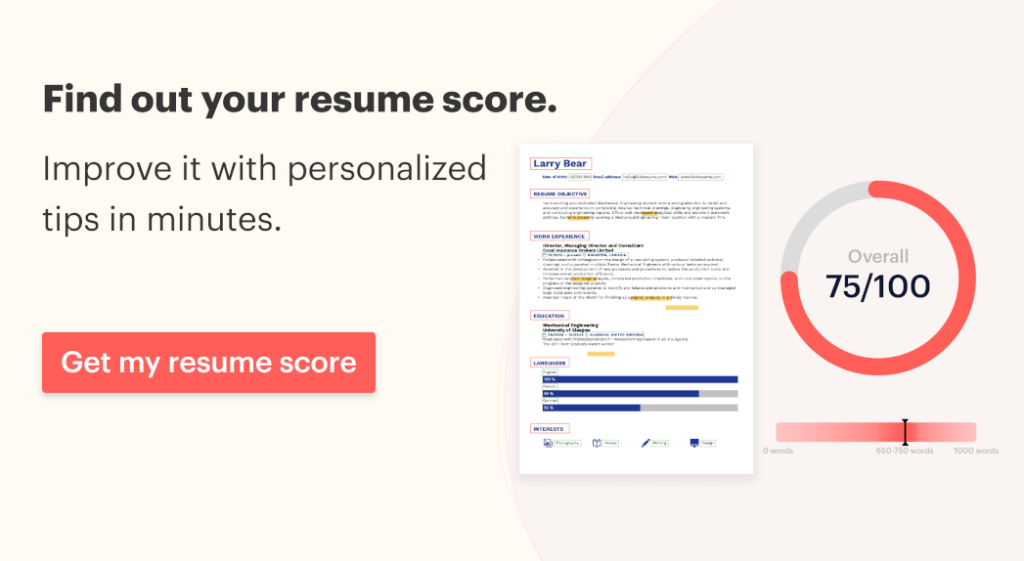
Email body for sending a resume: Keep it crisp, yet formal
Start off with a formal greeting and address the hiring manager by name (preferably last name).
In the first short paragraph you should state who you are, why you are sending this email and what the email contains.
Continue the next paragraph with a short but effective introduction of your best and proudest achievements. Of course, only mention those achievements that are relevant for the job. Close this paragraph by saying what value you would bring to the company and which skills you will use to accomplish this.
In the closing paragraph you need to say that you're looking forward to hearing back from them and meeting in person. You may add a captivating call for action but be careful not to sound rude or overly keen.
Yours faithfully (US English) or Yours sincerely (British English).
And finally, a professional signature is a must! Remember to include your contact details.
[Your name]
[Your job title]
[Email address]
[Phone number]
[LinkedIn profile] - optional
Remember, you want to keep the body of the email short and succinct. Don't go in too much detail otherwise you might loose the hiring manager's attention.
Keep in mind that you simply cannot elaborate on every accomplishment and every work experience due to limited space. The email needs to be informative and concise.
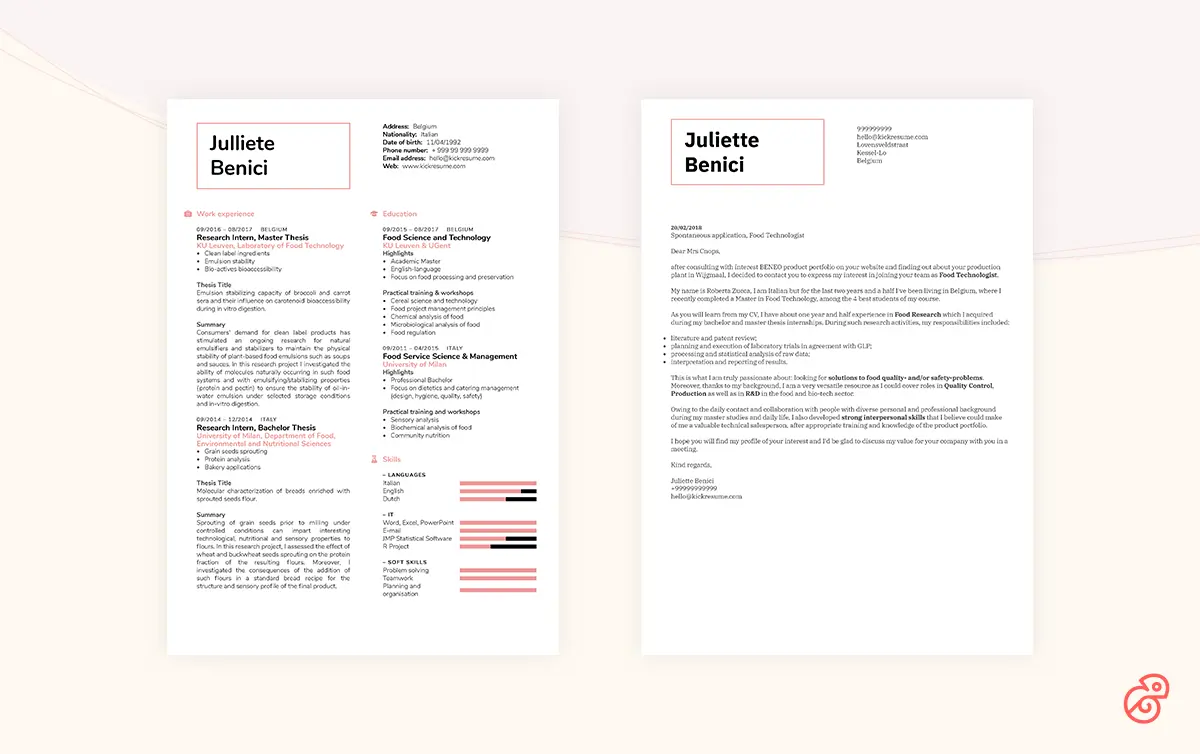
Attaching files — resume and cover letter
This should go without saying but, don't forget to attach your resume to the email!
Consider whether it's relevant to also attach your cover letter. When you apply for a job in bigger companies you may actually benefit from sending your cover letter as well as your resume. Just remember not to repeat yourself too much in your email body and your cover letter.
Avoid naming the attachments generically or randomly. Names like fghjvh.pdf or resume2.pdf can make it hard for the hiring manager to find these documents later. Name your attachments in a way that makes them easy to find — Name_Surname_Resume.pdf and Name_Surname_Cover_Letter.pdf
The best format for sending your resume and cover letter is .pdf or .doc. We suggest saving your documents as PDFs, since it's a universally accepted file format, it's easy to open and will not distort the formatting of your documents.
If you’re considering sending a video resume, you should know how to convert video to MP4, as it’s the most common format supported across different browsers and devices.
Keep in mind that files should not be larger than 10MB. Otherwise they might be considered suspicious.
Last but not least, before sending it out, get your resume analyzed to make sure it contains everything it should.
Key takeaways:
- Resume and cover letter need to be sent as attachments;
- Name your attachments in a way that makes them easy to find;
- Save documents in the PDF format;
- Files should not be larger than 10MB.
What should you do before sending your email?
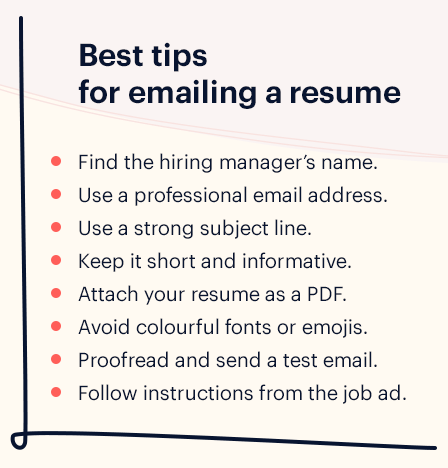
Before you send the email with your resume and cover letter, you should check it for any spelling or grammatical mistakes.
Having bad grammar is definitely not something you want to be remembered for. Ask a friend to proofread all your documents. It can make a big difference.
Additionally, it may be a good idea to send yourself a test email to see whether the formatting and layout of the email is up to the expected standard.
Don't forget to test download and open your files. Check whether you've attached the right file(s).
Also, avoid using any colorful fonts, pictures or emoticons.
What to write in your resume email? Key takeaways
Sending your resume attached to a well-written email can be a very effective strategy. It can help you find a way around ATS algorithms that filter out unsuitable resumes before they can even get to an HR employee for evaluation.
So how do you write one?
- Before you start writing the email, make sure you know who to address. Knowing the hiring manager's name will make the email feel more personal and decrease the chance of it being forgotten.
- Your resume address should sound professional. Send your resume email early on a Monday morning for maximum effectiveness.
- We have provided you with email templates. No matter which one you choose, remember — keep the email short, informative and professional.
- Attach your resume and cover letter in the PDF format and name them in a way that makes them easy to find, for example Name_Surname_Resume.pdf and Name_Surname_Cover_Letter.pdf
- After you have written the email and attached the documents, ask someone to proofread it for you to avoid any grammar errors and typos. Lastly, send yourself a test email to check the formatting and test download the files.
After you send in your resume, cover letter and your job application, wait for a couple of days before sending a follow up email.
Concluding thought — even if you construct the perfect email to send with your resume, you still need to make sure you have an impressive resume and cover letter.
We've got you covered. Check out these articles to help you create the perfect resume and cover letter:
- How to Write a Resume: The Only Resume Guide You’ll Need in 2024
- The Only Cover Letter Guide You’ll Need in 2024 (+Examples)

FAQ
- What to write in an email when sending a resume?
When emailing your resume to a hiring manager, start with a formal greeting using their last name. In the first paragraph, briefly introduce yourself and explain the purpose of your email. Next, highlight your most relevant and proud achievements, linking them to the value you can bring to the company and the skills you'll use to achieve this. Conclude by expressing your eagerness to hear back and the hope of meeting them in person. Sign off with "Yours faithfully" (US English) or "Yours sincerely" (British English), and include a professional signature with your contact details.
- What to write in an email when sending a resume subject?
When sending your resume to a hiring manager via email, the subject should always include your name and purpose, e.g. Job application – Job title — Your Name.
- What to write in an email when sending a resume with reference?
In your email when sending a resume with a reference, briefly introduce yourself, mention the position you're applying for, and how you came to know about it. Specifically mention your reference's name and your relationship with them. Then continue by highlighting your most relevant and proud achievements, linking them to the value you can bring to the company. Conclude by expressing your eagerness to hear back and meeting them in person. Sign off.




